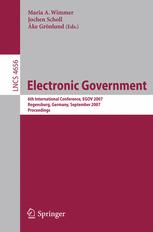

Most ebook files are in PDF format, so you can easily read them using various software such as Foxit Reader or directly on the Google Chrome browser.
Some ebook files are released by publishers in other formats such as .awz, .mobi, .epub, .fb2, etc. You may need to install specific software to read these formats on mobile/PC, such as Calibre.
Please read the tutorial at this link: https://ebookbell.com/faq
We offer FREE conversion to the popular formats you request; however, this may take some time. Therefore, right after payment, please email us, and we will try to provide the service as quickly as possible.
For some exceptional file formats or broken links (if any), please refrain from opening any disputes. Instead, email us first, and we will try to assist within a maximum of 6 hours.
EbookBell Team

5.0
38 reviewsEGOV 2007 was the sixth edition of this highly successful series of annual int- national conferences dedicated to electronic government research and practice. Like all its predecessors, EGOV 2007 achieved a remarkable number of paper submissions. Moreover, the quality of this year’s submissions again superseded previous years’ submissions. For the third year in a row, the conference was anteceded by a doctoral colloquium, with approximately 20 PhD projects d- cussed. The conference also provided a forum for academic work in progress, for practitioner reports, and for workshops on specialty topics. Along with the International Conference on Digital Government Research (dg.o)intheUSA andthe e-GovernmentTrackatthe HawaiiInternationalC- ference on System Sciences (HICSS), the EGOV series of conferences has est- lished itself as the leading annual conference on e-Government, e-Participation and e-Governance in Europe, with a global reach. Last year, the ?rst two professional societies were formed in North America 1 and Europe, the Digital Government Society of North America (DGSNA) and 2 the European EGOV Society (EGOV-S) . Both sister societies work closely - gether.Itisnoteworthythatbothsocietieshaveadoptedalmostidenticalmission statements. They both de?ne themselves as multi-disciplinary organizations “of scholars and practitioners engaged in and committed to democratic digital g- ernment. Digital (or electronic) government fosters the use of information and technology to support and improve public policies and government operations, engage citizens, and provide comprehensive and timely government services”.